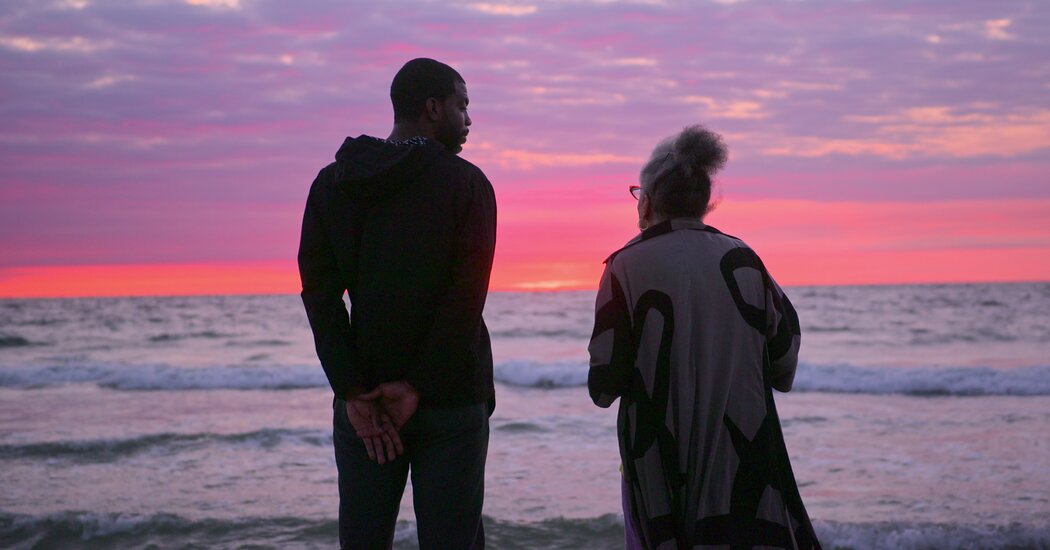
When Dr. Georgianne Thomas, 80, an author and adjunct professor of humanities at Clark Atlanta University, pushes aside the yellow bracelet adorning her wrist to reveal a burn mark, the table of people she’s dining with are stunned. The mark, decades old but still visible, was left by a Ku Klux Klan member putting out a cigarette on her arm during a protest in Atlanta when she was a 17-year-old freshman at Spelman College in 1960.
“It did something to me, but it didn’t stop me,” Dr. Thomas says, as Stephen Satterfield, 38, the writer and founder of Whetstone Media, wipes tears from his eyes across the table from her.
The conversation is part of the second season of Netflix’s “High on the Hog,” a docuseries exploring African American influence on cooking and cuisine in the United States. Over a meal at Paschal’s, a longtime soul food restaurant in Atlanta, Dr. Thomas, Charles Black and Marilyn Pryce Scott, all in their 80s, talk to a visibly moved Mr. Satterfield about joining a protest led by the Rev. Dr. Martin Luther King Jr. demanding service at the segregated Rich’s Department Store.
“These are histories that cannot be understood by even reading a textbook, and I feel that presence and historical significance being with you all here today,” Mr. Satterfield says to the group.
The scene is one of many intergenerational conversations that act as anchors in the second season of the show, scenes of honest and vulnerable communion, speaking to what can happen when African Americans of different ages spend time together over a meal.
Inspired by Dr. Jessica B. Harris’s 2011 book of the same name, the first season of the show focused on stories and dishes illustrating how enslaved Africans contributed to and shaped much of America’s cooking, tending not only to soil that grew crops that fed the nation, but also being “the hand in the pot,” bringing cooking techniques and West African-inflected dishes to a new continent. “Much of the first season was about folks who have gone on to become ancestors, folks who didn’t necessarily speak for themselves but spoke through their work or descendants,” said Dr. Harris, who appears in three of this season’s four episodes.
The second season, which traces the sprawling legacy of Black cooking through Reconstruction and along the routes of the Great Migration, presents more firsthand accounts of African Americans who have shaped cooking and dining in this country. “This season the folks who made the dish, or made that change are on camera and that’s a very big difference,” Dr. Harris said.
Profound moments are found at tables like the one Mr. Satterfield shared with activists in Atlanta, where he is able to connect dots for himself. In a Chicago-focused episode, he speaks with Benjamin Gaines Sr., a 99-year-old former porter on luxury railway Pullman cars, who moved to the city from Kentucky. Mr. Satterfield’s own grandfather who died before he was born, was also a Pullman Porter, moving to Chicago in the 1940s.
Listening to Mr. Gaines, who died in April, tell stories about working on train cars, providing luxury food and hospitality to white patrons, the “fuming anger” he felt when guests would disrespect him or even harm him physically, Mr. Satterfield felt like he saw part of his own family story that was once unavailable to him. “I was humbled to have a conversation with them that could have easily been missed,” he said in an interview. “We have to understand the context and through living ancestors who are embodying these stories.”
The experiences have changed him and how he engages with history and how Black people specifically share our stories as, what he calls “ancestors in training.”
“You don’t belong to just yourself,” Mr. Satterfield said. “We’re all ancestors already whether we acknowledge it or embrace it.”
In an emotionally charged scene with Elvin Shields, a retired mechanical engineer who grew up on a plantation as the child of sharecroppers, the topic of shame comes up. Mr. Shields and Mr. Satterfield discuss how so many young people don’t want to think about this past, or even feel discomfort with the word “plantation.”
“Plantation is ours, don’t make it a bad word. My ancestors lived and died here,” Mr. Shields says, adding, “now all of a sudden we should fear it or hate it or scorn it? No, we own it. We made it. We own it.”
Roger Ross Williams directed the first season and produced the second. (The second season is directed by Erik Parker and Kamilah Forbes.) He said that the show’s topics and conversations have become more pressing since it debuted in 2021.
“The massive erasure of Black history, book bannings and protests about critical race theory are going on right now,” he said.
For Mr. Williams, having a series that lays out, plainly and earnestly, how African Americans “continue to nourish America” is about making sure future generations know this history. “It’s a more gentle way of educating Americans about Black contributions to American food and history. You can’t ban Netflix.”
For Dr. Harris, the promise of the show is in these conversations, where ideas, experiences and history can flow between each participant openly. “You can talk across generations at the table,” she said. “It’s distressing that we don’t see that more often. That used to be Sunday dinner.”
On how she hopes people engage with the series, she added: “We’ve come a long way but we still have far to go. And as we continue we’re learning more about our history and the stories that have shaped who we are. That African hand in the pot is almost more profound than I thought it was when I wrote the book.”



